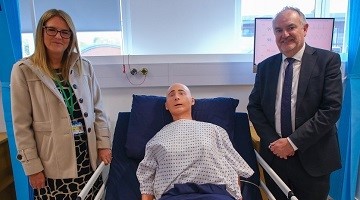Why study this course with LJMU?
- A degree leading to a higher than average salary
- Graduates highly sought after in the UK's fastest growing manufacturing industries
- Option to undertake a 12-month industrial placement (placement is not guaranteed)
- Support from a personal tutor for the duration of your course
- Wide range of career opportunities in the pharmaceutical, cosmetics, chemical, biotechnological, food, healthcare and related industries
- 100% of students surveyed said this course was intellectually stimulating (NSS 2024)
- International Foundation Year course available offering direct progression onto this degree programme - visit LJMU's International Study Centre to find out more
About your course
Completing the BSc (Hons) Pharmaceutical and Cosmetic Science with Foundation Year degree programme at Liverpool John Moores University will help you enjoy excellent career prospects and earning potential in a variety of sectors after you graduate.
About the Foundation Year
The Foundation Year is ideal if you have the ability to study for a degree but do not have the qualifications to enter directly onto the Pharmaceutical and Cosmetic Science honours degree programme.
Once you pass the Foundation Year, you will progress directly onto the first year of the honours degree. If you are a full-time UK student, you will qualify for student financial support for the full duration of your course (subject to eligibility criteria).
About BSc (Hons) Pharmaceutical and Cosmetic Science
On this BSc (Hons) Pharmaceutical and Cosmetic Science programme you will learn about the science of medicines, from the identification and isolation of biologically active compounds through to the analysis and formulation into medicines for clinical use.
The aim of this degree course is to provide you with knowledge and understanding of core subject matter and first-hand experience of relevant laboratory techniques to enable you to pursue a career in the pharmaceutical or cosmetic industries or progress to further study. The programme has been designed to give you a solid foundation in the subjects that underpin Pharmaceutical and Cosmetic Science and then to explore how research and development procedures are applied in the industry.
The course will not only give you technological know-how, but also the transferable key skills to give you that competitive edge when it comes to climbing the career ladder. We encourage you take advantage of the opportunity to complete a one year placement after Level 5 as it will give direct experience of working in the industry, helping you identify career options and adding real value to your CV after graduation.
There are three main themes embedded throughout the programme: Chemistry and Analysis; Formulation and Production; and Physiology and Biological Activity. During level 3, students will develop knowledge, understanding and practical skills associated with the study of biology, chemistry and general science. Core modules have been designed to provide basic understanding and knowledge of general scientific principles and methodologies. These are supported with training in laboratory methods as well as other practical and key skills.
In levels 4 and 5, the subjects that underpin Pharmaceutical and Cosmetic Science are explored in depth and then in level 6 the focus is on more advanced principles and techniques and how the research and development procedures are applied in the industry.
Course modules
What you will study on this degree
Further guidance on modules
Modules are designated core or optional in accordance with professional body requirements, as applicable, and LJMU’s Academic Framework Regulations. Whilst you are required to study core modules, optional modules provide you with an element of choice. Their availability may vary and will be subject to meeting minimum student numbers.
Where changes to modules are necessary these will be communicated as appropriate.
Core modules
Introduction to Molecular Biology and Genetics
20 credits
20 credits
This module provides an introduction to molecular biology and genetics.
Human Anatomy and Physiology
20 credits
20 credits
The aim of this module is to develop your knowledge and understanding of the basic structure and function of key physiological systems and metabolic processes. It will also introduce the concepts of human physiology and their inter-relationships.
Fundamental Science Skills
20 credits
20 credits
This module aims to provide and develop the basic skills required to successfully study a programme in the molecular bioscience areas.
Introduction to Chemistry
20 credits
20 credits
This module covers introductory laboratory skills and fundamental physical and inorganic chemistry concepts, alongside a brief introduction to organic chemistry.
Introduction to Biochemistry and Cell Biology
20 credits
20 credits
This module provides an introduction to cell structure and biochemistry.
Further Chemistry
20 credits
20 credits
This module covers fundamental organic chemistry concepts.
Core modules
Physical Properties
20 credits
20 credits
This module will introduce the basic principles of physical chemistry as they relate to the formulation of drug products.
Organic Chemistry
20 credits
20 credits
This module enables you to explore the structure, bonding, functionality and reactions of organic molecules with specific reference to pharmaceutically important drugs. You will also develop your ability to practice chemical laboratory skills.
Principles of Human Biology and Disease
20 credits
20 credits
This module enables you to explore principles of human physiology and pathology with respect to homeostatic mechanisms. You will learn about bacteria, viruses and fungus and their role in human health and disease.
Formulation Science
20 credits
20 credits
This module enables you to understand the physicochemical properties of active pharmaceutical ingredients and introduces you to the basic principles of pharmaceutical formulation.
Analytical Chemistry
20 credits
20 credits
This module provides you with the basic, practical and relevant mathematical and analytical chemistry foundation for the quantitative aspects all Pharmaceutical modules.
Biologically Active Molecules
20 credits
20 credits
The aim of this module is to develop your ability to gather, evaluate and communicate scientific information in order to facilitate the application of information presented to solve problems.
Core modules
Principles of Pharmacology
20 credits
20 credits
The module aims to develop your knowledge of anatomical, physiological and pharmacological organisation of biological systems.
Pharmaceutical Formulation
20 credits
20 credits
This module introduces you to the formulation, manufacture and testing of solid oral pharmaceutical dosage forms (tablets and capsules) as well as the development of oral modified release dosage forms.
Synthetic and Natural Drugs
20 credits
20 credits
This module aims to present and illustrate the principles and processes involved in the discovery, acquisition of, and analysis of a range of natural, synthetic and biotechnologically produced drugs.
Sterile Pharmaceutical Products
20 credits
20 credits
This module enables you to learn about the formulation, preparation, manufacture and quality control of sterile products. You will be able to describe and discuss the principles and practice of sterilisation and the concepts of quality assurance of sterile products.
Pharmaceutical Analysis
20 credits
20 credits
The aim of this module is to develop your knowledge, practical experience and interpretation skills necessary for the quantitative and qualitative analysis of chemical species relevant to the pharmaceutical industry.
Principles of Cosmetic Products
20 credits
20 credits
The aim of this module is to develop your knowledge of the scientific principles applied in the preparation and analysis of cosmetic products.
Optional Modules
Sandwich Year - Pharmaceutical Science
120 credits
120 credits
The aim is to provide students with an extended period of work experience at an approved partner that will complement their programme of study at LJMU. This will give students the opportunity to develop professional skills relevant to their programme of study as well as the attitude and behaviours necessary for employment in a diverse and changing environment. This extended placement forms a key part of a sandwich degree. All placements need to be assessed and approved prior to commencement in line with the LJMU Placement Learning Code of Practice. The Code of Practice requires students to conduct themselves in a professional and responsible manner during the placement - failure to do so may lead to the placement being terminated prematurely. Placements are normally for one calendar year on a full-time basis. Split placements of a shorter duration may be permissible. There is an expectation that a minimum of 1200 hours will be spent in the workplace.
Study Year Abroad - Pharmaceutical Science
120 credits
120 credits
The aim is to provide students with an additional year of study at an approved overseas partner that will complement their programme at LJMU. This is an additional year of full-time study at an approved higher education institution. The modules to be studied must be agreed in advance, and must be appropriate for the student's programme of study. Assuming successful completion of this year, mark-bearing credit will be awarded by the Faculty Recognition Group. The grade conversion scale to be used will be made available in advance of the year abroad.
Study Semester Abroad - Pharmaceutical Science
60 credits
60 credits
The aim is to provide students with a semester of study at an approved overseas partner that will replace one semester of their LJMU programme at level 5.This is a semester of full-time study at an approved higher education institution which will replace one semester of level 5 study at LJMU. The modules to be studied must be agreed in advance, and must be an appropriate substitute for the modules being replaced. Assuming successful completion of this semester, mark-bearing credit will be awarded by the Faculty Recognition Group. The grade conversion scale to be used will be made available in advance of the semester abroad.
Core modules
Research Methods and Project
40 credits
40 credits
The aim of the module is to enable you to plan, execute and report results of a research project in the area of pharmaceutical sciences, using a range of appropriate resources and methodology.
Industrial Product Development
20 credits
20 credits
Within this module, you will gain information relating to pharmaceutical manufacturing processes and the associated regulatory controls to ensure consistency of patient safety.
Advanced Pharmaceutical Analysis
20 credits
20 credits
The module is designed to provide you with the concepts and practical experience necessary to pursue a career in an analytical role in the pharmaceutical industry, and to be aware of the limitations of analytical techniques upon which you may rely for information.
Advanced Delivery Systems
20 credits
20 credits
This module will present and illustrate methods for the formulation and application of advanced drug delivery systems.
Safety Assessment of Pharmaceuticals and Cosmetics
20 credits
20 credits
The aim of this module is to gain an awareness and understanding of preclinical testing and management and regulation of clinical trials in the process of drug development.
Your Learning Experience
Excellent facilities and learning resources
We adopt an active blended learning approach, meaning you will experience a combination of face-to-face and online learning during your time at LJMU. This enables you to experience a rich and diverse learning experience and engage fully with your studies. Our approach ensures that you can easily access support from your personal tutor, either by meeting them on-campus or via a video call to suit your needs.
The programme incorporates a range of teaching methods and there is a strong focus on learning through problem-solving and data interpretation in several modules at each Level. There is also an emphasis on developing practical, research and transferable skills throughout the programme.
Modules are delivered by a mixture of lectures, workshops, tutorials, online activities and laboratory practical sessions. Modules typically introduce the theory underpinning the various topics through lectures and students then engage in workshops to apply the theory during activity-based sessions, which may involve group work, peer-learning and data manipulation or analysis.
Work-related learning
Work-related learning is a vital element of your studies, as it will give you that extra competitive edge when you come to negotiate your way around the graduate job market. For this reason, we encourage you to undertake an industrial placement after your second year. Although this is not compulsory, it will boost your job prospects and give you a chance to put into practice skills and knowledge you have acquired in the first two years at LJMU.
Dedicated personal tutor, plus study skills support
There will be times during your course when you need guidance and advice related to your academic studies or more personal matters. For this reason you will be allocated a personal tutor for the duration of your course and take part in small tutorial groups where you can discuss course material in a more informal setting. Individual support is also particularly valuable when you work independently on your research project so you will be allocated a supervisor who will discuss aspects of your work in one-to-one tutorials.
The school is fully committed to promoting a learning environment that supports a culture of equality, diversity and inclusivity (EDI) and has a Disability Support Coordinator, an EDI Coordinator and a School EDI Working Group. Personal Tutors also play a vital role in promoting awareness of support services for students.
Assessment varies depending on the modules you choose, but will usually include a combination of exams and coursework.
There are a number of different assessment styles used at each level of the programme including laboratory reports, essays, presentations and online exercises. Some modules also incorporate formative assessments, particularly at lower levels. Most modules comprise an assessment weighting of 60% Exam: 40% coursework. Examinations comprise multiple-choice questions, written answers or problem-based questions and sample questions are made available to aid student preparation and revision.
Feedback, either written or verbal, is provided on all formatively and summatively assessed coursework. Modules will specify a feedback deadline alongside assessment submission deadlines. Feedback will normally be available within 15 working days after the assessment deadline and will relate to the specific assessment criteria. Many assessments utilise online marking rubrics, which illustrate to students how each assessment criterion is to be met, alongside the corresponding range of grade ratings.
Where you will study
You will study at the Byrom Street site in the university's City Campus in the heart of Liverpool. Our state-of-the-art laboratories and teaching spaces will ensure you enjoy a first-class study environment. The Avril Robarts library is within easy walking distance and here you'll find all the information you need to support your studies.
Course tutors

Dr Raida Al Kassas
Programme Leader
I teach the students to recognise the relevance of the topic in the context to which they can relate. I particularly enjoy mentoring students, celebrating their success and seeing the results of my hard work with them
I teach the students to recognise the relevance of the topic in the context to which they can relate. I particularly enjoy mentoring students, celebrating their success and seeing the results of my hard work with them
Dr Al Kassas has a PhD in Nanotechnology, Pharmaceutics and Drug Delivery Systems, obtained from Queens University, Belfast. She previously worked as an Associate Professor in Pharmaceutics at King Saud University and Senior Lecturer in Pharmaceutics and Nanotechnology at the University of Auckland. Dr Al Kassas is a member of LJMU's Formulation and Drug Delivery research group. Her area of research is focused upon improving the safety and efficacy of medicines using nanotechnology. She has successfully established a research programme in the use of nanoparticles for incorporation of bioactive small and macromolecules, such as DNA, siRNA, antigens and proteins for immunization and the treatment of cancer. Dr Al Kassas has also conducted research into ocular drug delivery using advanced pharmaceutical formulations.
-
 Lecturer/Senior Lecturer
Lecturer/Senior Lecturer -
 Lecturer/Senior Lecturer
Lecturer/Senior Lecturer


I had the opportunity to do a work placement at BASF in Germany. This experience has given me the confidence and knowledge to go on and do a PhD
Career paths
Successful graduates can enjoy above average salaries in these fast-growing sectors.
The pharmaceutical and cosmetic industries continue to be strong in terms of turnover and employment and consequently there is a high demand for graduates in these scientific disciplines. This degree programme is the ideal platform from which to launch your career as it is designed to meet the high demand for highly skilled and technology literate people to help these industries continue to be innovative and compete on a global scale. As a Pharmaceutical and Cosmetic Science graduate you can expect a career in the pharmaceutical, cosmetic, chemical, biotechnological, food, healthcare and related industries, in fields such as research and development, formulation science, quality control, quality assurance, regulatory affairs, clinical trial management, process development or product registration.
Graduates can also choose to continue their studies at LJMU by undertaking one of the many postgraduate masters courses available, such as MSc Drug Discovery, Development and Delivery, MSc Industrial Biotechnology or MSc Cosmetic Science.
Student Futures - Careers, Employability and Enterprise Service
A wide range of opportunities and support is available to you, within and beyond your course, to ensure our students experience a transformation in their career trajectory. Every undergraduate curriculum includes Future Focus during Level 4, an e-learning resource and workshop designed to help you to develop your talents, passion and purpose.
Every student has access to Careers Zone 24/7, LJMU's suite of online Apps, resources and jobs board via the LJMU Student Futures website.
Tuition fees and funding
- Full-time per year:
- £9,535
- Placement year:
- £1,905
The University reserves the right to increase tuition fees in accordance with any changes to the maximum allowable fees set by the UK Parliament. In the event of such a change, any fee increase will be subject to a maximum cap of 10% of the total course cost as originally stated at the time of your offer.
The fees quoted above cover registration, tuition, supervision, assessment and examinations as well as:
- library membership with access to printed, multimedia and digital resources
- access to programme-appropriate software
- library and student IT support
- free on-campus wifi via eduroam
Additional costs
Although not all of the following are compulsory/relevant, you should keep in mind the costs of:
- accommodation and living expenditure
- books (should you wish to have your own copies)
- printing, photocopying and stationery
- PC/laptop (should you prefer to purchase your own for independent study and online learning activities)
- mobile phone/tablet (to access online services)
- field trips (travel and activity costs)
- placements (travel expenses and living costs)
- student visas (international students only)
- study abroad opportunities (travel costs, accommodation, visas and immunisations)
- academic conferences (travel costs)
- professional-body membership
- graduation (gown hire etc)
Funding
There are many ways to fund study for home and international students. From loans to International Scholarships and subject-specific funding, you'll find all of the information you need on our specialist funding pages.
- Full-time per year:
- £18,250
- Placement year:
- £3,830
International Scholarships and payment plans
Liverpool John Moores University is committed to supporting international students by providing a range of scholarships and flexible payment plans to help students manage their tuition fees.
Scholarships
LJMU provides a variety of scholarships to support international students. Scholarships are available to self-funded students who have accepted their offer and met all the conditions outlined in their offer letter. Students must also demonstrate that they can cover living costs, travel, and other expenses associated to studying at the university. Postgraduate scholarships include tuition fee reductions and are often offered in partnership with external funding organisations.
All self-funded international students are eligible for an automatic scholarship worth up to £4,000. For more details and to view our full list of scholarships, visit the international scholarship webpages.
Deposit
All students must pay a £5,000 deposit before they can receive their CAS letter.
For more information view our deposit page.
Tuition Fee Payment Plan
After paying their £5,000 deposit, students have the option to pay their fees in full or in three equal instalments minus any internal scholarships and discounts. There are two payment options available for international students. You can either pay your tuition fees in full before enrolment or opt for a payment plan. With the payment plan, you can pay your fees in three instalments after making your £5,000 deposit. The first instalment is due before enrolment.
All payments should be made through Flywire. Full details can be found in the How to Pay Guide.
Early Bird Tuition Fee discount
We are excited to introduce a £500 Early Payment Discount to all self-funded international students. Eligible self-funded students who pay their fees by the required deadlines will get a discount which will be automatically deducted from the 1st year of tuition fees.
To see the required deadlines please visit the webpage
A DBS check is not required for your application, however a DBS may be required for modules where there is a work based learning placement option. Work based learning placements that do not require a DBS check are available.
Entry requirements
Please choose your qualifications below to view requirements
Grades/points required from qualifications: CCD-CCC (88-96)
Work out how many UCAS points your qualifications are worth by visiting the UCAS Tariff Calculator.
Qualification requirements
GCSEs and equivalents
Grade 4 or grade C or above in English Language and Mathematics/ Numeracy.
GCSE Equivalences accepted:
• Key Skills Level 2 in English/Maths
• NVQ Level 2 Functional skills in Maths and English Writing and or Reading
• Skills for Life Level 2 in Numeracy/English
• Higher Diploma in Maths/English
• Northern Ireland Essential Skills Level 2 in Communication or Application of Number
• Wales Essential Skills Level 2 in Communication or Application of Number
A levels
CCD-CCC
One Science related subject
BTECs
Extended Diploma: MMM (96)
MMM in a relevant science if studied on its own or to the total of 88 UCAS points when combined with other qualifications
Access awards
Acceptable on its own and combined with other qualifications
Pass overall with a minimum of 88 points.
Access awards
Acceptable on its own and combined with other qualifications From a relevant subject
OCR Cambridge Technical
Extended Diploma: MMM (96)
MMM in a relevant science if studied on its own or to the total of 88 UCAS points when combined with other qualifications
Irish awards
Acceptable on its own and combined with other qualifications From a relevant subject
T levels
Acceptable on its own and combined with other qualifications.
You need to obtain the required UCAS points from a related subject area.
International requirements
IELTS
6.0 overall with no component below 5.5, taken within two years of the course start date.
https://www.ljmu.ac.uk/study/courses/international-entry-requirements
Please Note: All international qualifications are subject to a qualification equivalency check.
How to apply
Securing your place at LJMU
UCAS is the official application route for our full-time undergraduate courses. Further information on the UCAS application process can be found here https://www.ljmu.ac.uk/study/undergraduate-students/how-to-apply.
Your university life
From accommodation and academic support to clubs and societies. Find out what LJMU has to offer.
Related Links
Talk to our students
Connect with a current LJMU student for advice and guidance on university life, courses and more.
See what our students are saying
At LJMU we want you to know you're making the right choice by studying with us. You can see what our students are saying about their experience with us through their reviews on the following websites:
Related Links
News and views
Browse through the latest news and stories from the university










The university reserves the right to withdraw or make alterations to a course and facilities if necessary; this may be because such changes are deemed to be beneficial to students, are minor in nature and unlikely to impact negatively upon students or become necessary due to circumstances beyond the control of the university. Where this does happen, the university operates a policy of consultation, advice and support to all enrolled students affected by the proposed change to their course or module.
Further information on the terms and conditions of any offer made, our admissions policy and the complaints and appeals process.



















